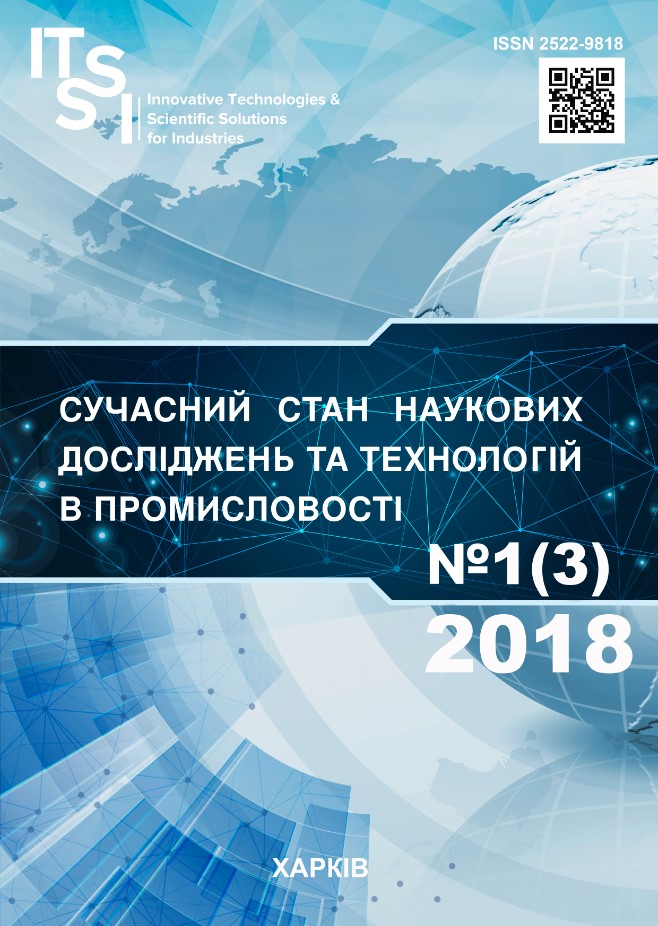PRIORITY TRENDS IN ENSURING THE ENERGY SECURITY OF UKRAINE IN THE TERMS OF EUROINTEGRATION
DOI:
https://doi.org/10.30837/2522-9818.2018.3.116Keywords:
energy security, energy intensity, energy materials, European integration processes, fuel and energy resourcesAbstract
The subject matter of the study is to find the priority tasks and to select ways to ensure the energy security of Ukraine as well as to identify its energy potential for accelerating the economic growth. The goal of the article is to study the trends and strategic prospects for creating, developing and ensuring the energy security of Ukraine under the conditions of European integration reforms. The following methods and ways of scientific research were used in the article: the dialectical and the system approach was used to generalize the scientific study; the method of logical generalization was used to study the existing situation and to justify the directions for ensuring the energy security, to substantiate the relevance of the topic, the goal and objectives of the study, to identify the essential features and threats of the excessive use of imported energy supplies; the method of grouping to systematize tasks and ways to diversify the energy consumption in Ukraine. Ukraine has a significant potential for accelerating the economic development and enhancing the energy security. The energy security is an important component of the national security of the state and one of the global problems of every country in the world. To realize the existing potential, Ukrainian laws and regulations should be reformed and the requirements of international agreements should be met, the relations with the countries of the European Union should be developed. The following tasks were solved: the current state of fuel and natural resources security of Ukraine was analyzed and the ways for improving the energy security were systematized, the trends in the development and the priorities of the strategic prospects of Ukraine in the context of integration processes were studied. The following results were obtained: the main steps to ensure the energy security of Ukraine, to enhance the cooperation with the EU countries, to strengthen the relations in the context of the energy security were highlighted, the available energy potential for accelerating the economic growth was substantiated. Conclusions. The need to neutralize threats to energy efficiency as a diversification of energy consumption in Ukraine is proved. This approach will ensure the international competitiveness of the Ukrainian economy, the prerequisites for membership in international organizations; it will also stimulate the renewal of the domestic energy industry. The prospects for further research in this area are the study of the development of the competitive energy market and transition to the energy-efficient use of energy resources in order to ensure the energy security of Ukraine.References
Voynarenko, M. P., Mykolyuk, O. (2017), “Strategic energy security outlook formation of Ukraine under European integration process”, Scientific bulletin Polesie, No. 3 (11), P. 1, P. 29–37.
“Global Energy Security” ["Globalnaya energeticheskaya bezopasnost"], available at : http://g8russia.ru/docs/11.html (last accessed 15.03.2018).
Dzyadikevich, Yu. V., (2015), “Prospects for Enhancing Ukraine's Energy Security”, Innovative economy, No. 1, available at : http://www.uceps.org/ukr/journal (last accessed 11.03.2018)
Dodonov, B. Monitoring energy efficiency in Ukraine, available at : http://g8russia.ru/docs/11.html (last accessed 15.03.2018).
Energy industry of Ukraine. Results for 2015, available at : http://razumkov.org.ua/upload/2016_ENERGY.pdf (last accessed 15.03.2018).
Comments and suggestions for the Energy Strategy of Ukraine for the period up to 2035 available at : http://necu.org.ua/wp-content/uploads/NECU_proposals_energy_strategy2035.pdf (last accessed 15.03.2018).
Ukraine's New Energy Strategy by 2020: Security, Energy Efficiency, Competition, available at : http://www.razumkov.org.ua/ua/upload/Draft%20Strategy_00%20(7).pdf (last accessed 15.03.2018).
Preparation of changes to the Energy Strategy of Ukraine for the period up to 2030, approved by the order of the Cabinet of Ministers of Ukraine dated July 24, 2013 № 1071, available at : http://bioenergy.in.ua/media/filer_public/strategiyi.pdf. (last accessed 18.03.2018).
Results of the energy industry in Ukraine: 2015, available at : http://razumkov.org.ua/ua/upload/1457691315 (last accessed 24.03.2018).
Statistical Yearbook of World Energy 2015 [Statisticheskiy ezhegodnik mirovoy energetiki 2015], available at: http://yearbook.enerdata.ru/energy-intencity-GDP-by-region.html. (last accessed 24.03.2018).
Tarnavsky, V. (2016), “Europe has reached the second level”, Energy of Ukraine, No. 2, available at : http://www.uaenergy.com.ua/c225758200614cc9/0/ (last accessed 22.03.2018).
Quarterly Report on European Gas Markets (2011), Market Observatory for Energy (Directorate General for Energy, European Commission), No. 4, Р. 2, April–June, available at : http://ec.europa.eu/energy/observatory/gas/doc/qregam_2011_quarter2.p. (last accessed 22.03.2018).
Ukraine and the EU signed a memorandum on energy partnership, available at : http://www.epravda.com.ua/news/ (last accessed 28.03.2018).
Downloads
Published
How to Cite
Issue
Section
License
Copyright (c) 2018 Oksana Mykoliuk

This work is licensed under a Creative Commons Attribution-NonCommercial-ShareAlike 4.0 International License.
Our journal abides by the Creative Commons copyright rights and permissions for open access journals.
Authors who publish with this journal agree to the following terms:
Authors hold the copyright without restrictions and grant the journal right of first publication with the work simultaneously licensed under a Creative Commons Attribution-NonCommercial-ShareAlike 4.0 International License (CC BY-NC-SA 4.0) that allows others to share the work with an acknowledgment of the work's authorship and initial publication in this journal.
Authors are able to enter into separate, additional contractual arrangements for the non-commercial and non-exclusive distribution of the journal's published version of the work (e.g., post it to an institutional repository or publish it in a book), with an acknowledgment of its initial publication in this journal.
Authors are permitted and encouraged to post their published work online (e.g., in institutional repositories or on their website) as it can lead to productive exchanges, as well as earlier and greater citation of published work.














